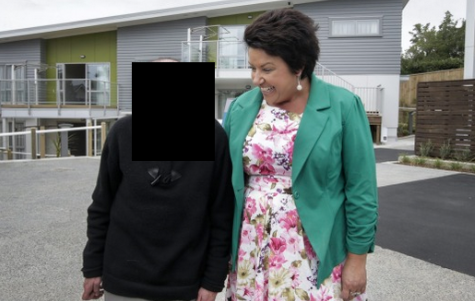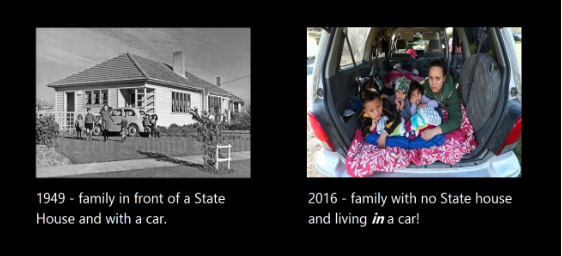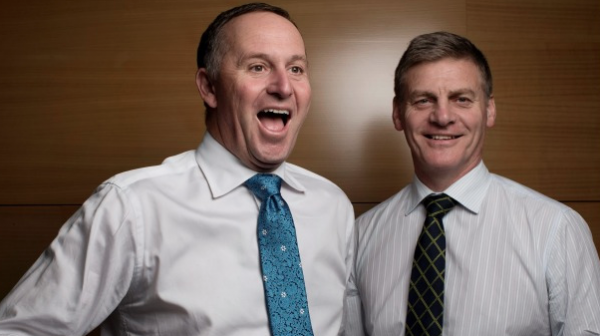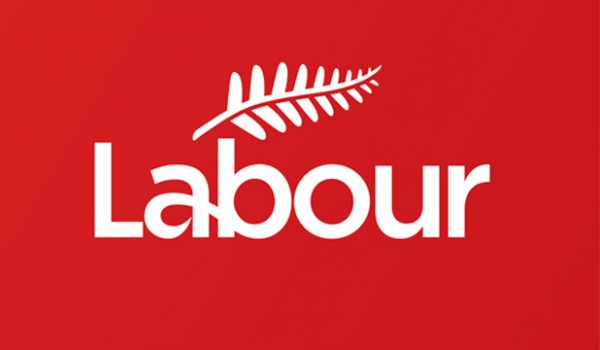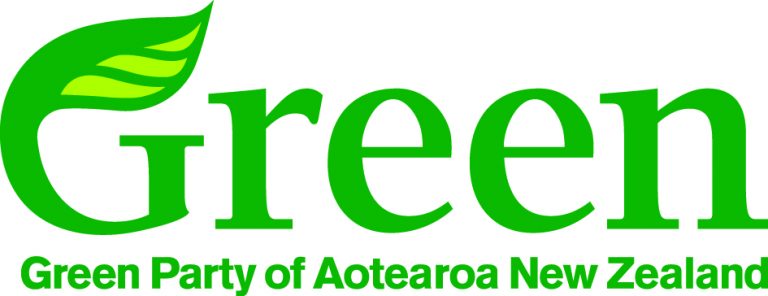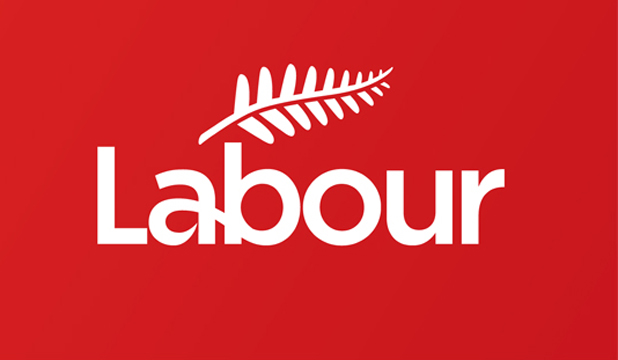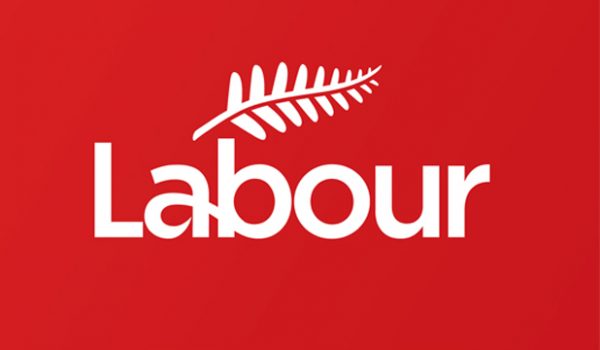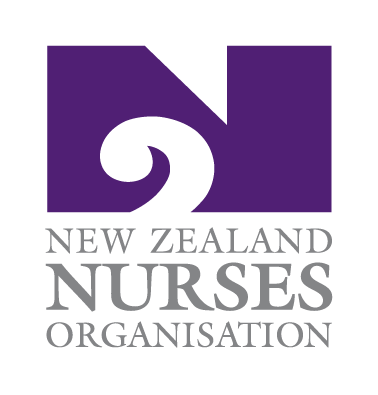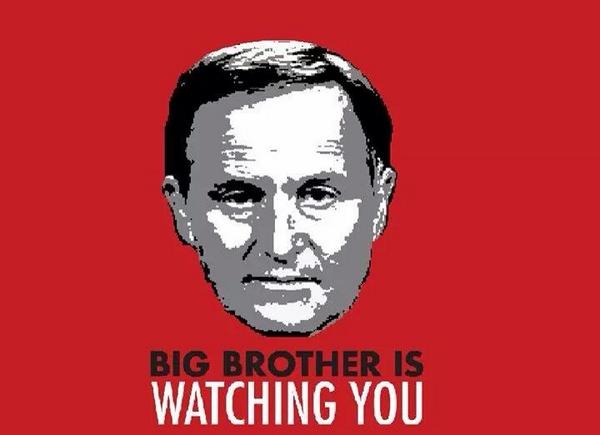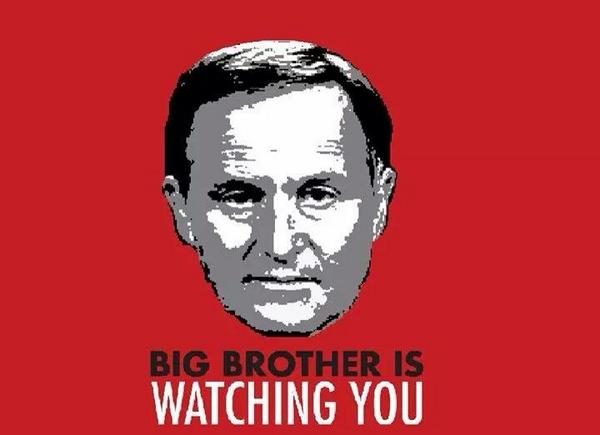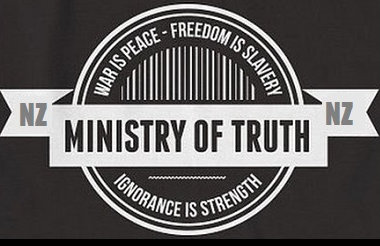.

.
In the last few years, my writing has involved a wide range of topics affecting the social/economic/political aspects of our nation. The one common factor in my writing has been the ability to research facts and figures and put them into some usable context, either for evidential, or high-lighting purposes.
Offering an opinion that the government is hollowing-out Child,Youth, and Family is one thing. Carrying out research; finding information through the ‘net; asking specific questions using the Official Information Act are the means by which hard facts can be mined; refined; and presented to the reader in a form that presents a credible case to the audience. Stories such as “State house sell-off in Tauranga unravelling?” and “Ongoing jobless tally” are put together using information, quotes, financial and statistical data.
Two stories late last year illustrated how National – with silence or active co-operation by compliant state-sector bosses – has been able to manipulate statistics to present a favourable public perception of it’s management of the country.
.

.
Though occassionally, the truth slips out, as Greg O’Connor revealed on TVNZ’s Q+A on 25 October, last year;
.
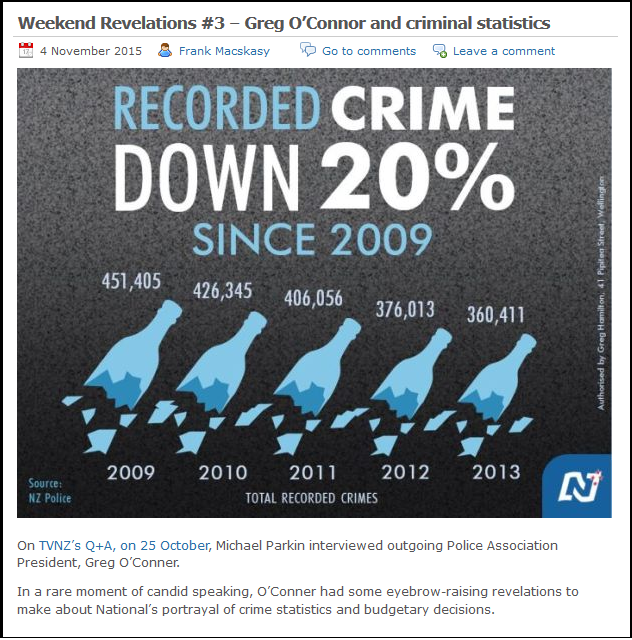
.
Fudging statistics, numbers, facts, and dollar-figures is not isolated when it comes to this government. Only a few days ago, English was sprung giving false financial information relating to Sue Moroney’s paid-parental leave bill;
.
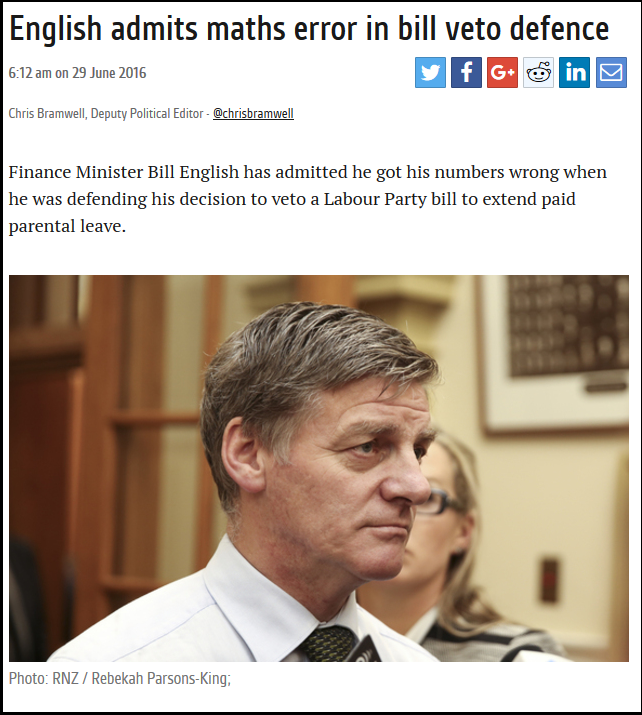
.
The Radio NZ report went on to state;
Ms Moroney challenged him about the figures in Parliament.
“Does he stand by his statement to Radio New Zealand on 17 June 2016 that extending paid parental leave to 26 weeks would add when it’s fully in place about $280 million a year.”
Mr English admitted he was incorrect and should have used the figures written in the veto certificate he himself had tabled.
“The government currently spends about $280m a year on paid parental leave, Labour’s proposal once fully implemented would cost around $120m per year on top of that – or $100m per year net of tax. Net of tax the proposal would cost $280m over the next four years.”
Ms Moroney then asked how Mr English got it so wrong.
He replied that he did so because he confused the $280m over four years, with $280m a year.
This is our Finance Minister confusing $280 million per year with over a four-year period. No wonder we’re over $60 billion in debt.
National has been crowing for the last few years that “crime has been falling“;
.

.
Even the Police Commissioner got in on the ‘act’;
.

.
“A huge amount of hard work from our Police has gone into achieving these fantastic results,” said Tolley in 2013. “Fantastic” is right – as in fantasy-fantastic.
Because it did not take long before people started realising that the Police stats were dodgy, and most likely bogus.
This was confirmed by outgoing Police Association President, Greg O’Conner, on TVNZ’s Q+A, on 25 October, in a very candid interview with Michael Parkin.
On statistics, Parkin referred to National and Police trumpeting a 30% drop in crime. O’Conner responded wryly;
@3.10
“Well, it’s uh, lies, damned lies, and statistics. If you look at the crime stats, um, which is those recorded stats, you’ll say the government and police administration are right. If you look at the stats around calls for service, they’re the phone calls that police receive in communications centes, etc, and just an example, family violence, domestic disputes; up by 10% a year pretty much, and across the board, 20% increase. So it’s the calls for service, to the extent that the communications centres couldn’t manage last summer. There’s a fear, and we’re obviously we’re trying to make sure it doesn’t happen this year. So the two are going in completely different directions.”
Parkin pointedly asked if the statistics are being manipulated. O’Conner’s response was startling in it’s honesty;
@3.55
“Of course they are. Every government department – I mean, what happens is that, the stats themselves are fair, but I mean I see it as a debate [like] about health, y’know, medical – the waitings lists have going down, but people get kicked of waiting lists and so it’s, you achieve – Put it this way, with crime stats, what we’ve set out to do is the way to cut crime stats is to hit your bulk crime. So if you have any success there, of course, that’s going to be big numbers down. And what you ignore is your small numbers. You ignore, in fact, interestingly enough you ignore drugs. You ignore a lot of your serious stuff that you only find if you go looking. And in the past that’s got us into real trouble. Got us into trouble with the child abuse files, in particular, and you remember, that they were put aside. Because they weren’t politically known. They were business as usual. All of a sudden we were concentrating on the crime and crash reduction, um, and we ignored that stuff. And so you’ve got to be careful. And this is where the politicisation of policing is really dangerous. It’s not done by the Minister saying ‘you gotta do this and you gotta do that’, it’s done by funding.”
O’Conner’s scorn is confirmed by an event last year where one police district was caught out, red-handed, falsifying crime statistics. Seven hundred burglary offences “disappeared”;
.

.
Herald journalist, Eugene Bingham, reported;
“ It transpired others knew about the allegations around the same time, including the local MP and then-Minister of Justice, Judith Collins.”
.
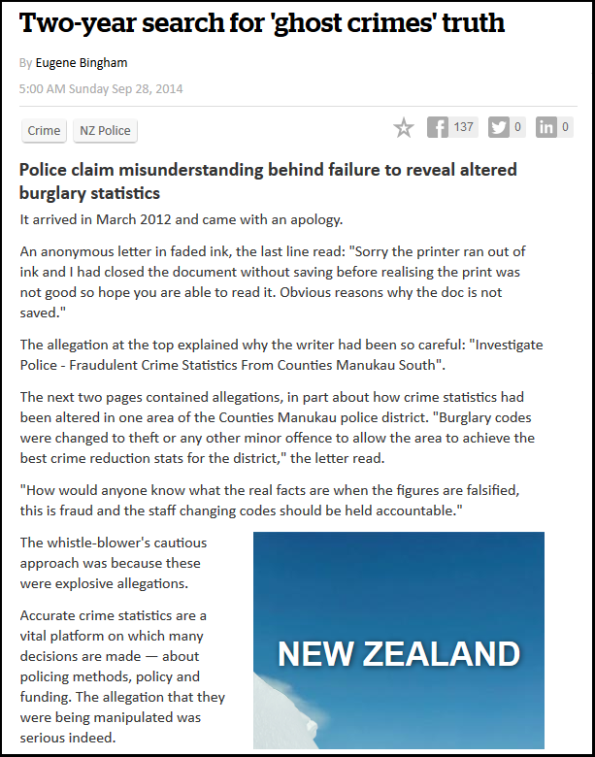
.
A police report “raised questions over pressures to meet crime reduction targets”, but Police were quick to assure that the fudged stats were “isolated“;
.

.
“Isolated”? As far back as 2012, Police were issuing warnings for petty-crime, instead of prosecuting;
.
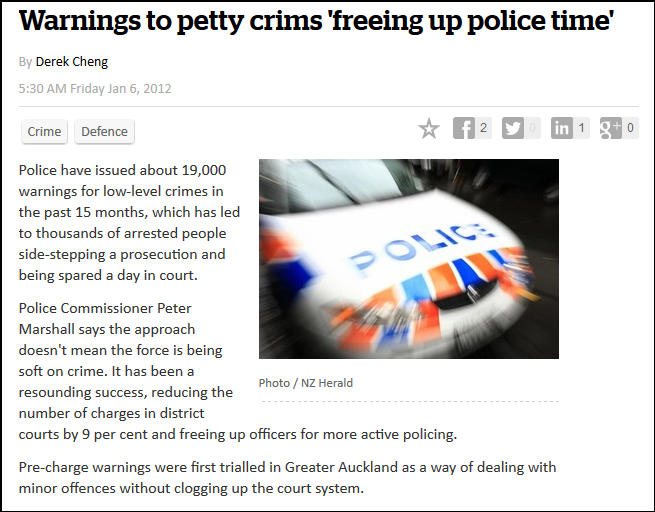
.
Then-Police Commissioner Peter Marshall said;
“ These are 19,000 people who would otherwise go to court, who would clutter up the system in terms of court time, let alone police officers preparing prosecution files and spending time in court.”
So the policy of issuing warnings “freed up police time” and “un-clogged the Court system”?
It also created a drop in crime statistics.
How convenient.
The above Herald story, “Warnings to petty crims ‘freeing up police time’ ” appeared in the Herald in January 2012. So by April 2013, Police Minister Anne Tolley was able to say with (almost) a straight face;
“ These statistics show that our Police are getting it right, and I want to congratulate the Commissioner and all Police staff for their efforts in preventing crime and making communities safer.”
It’s easy to reduce crime. Just “massage” the stats away.
“Massaging” statistics does not work for long, as current Police Commissioner Bush recently discovered;
.

.
(Listen also to Radio NZ Checkpoint interview (2′ 39″))
Both Police Minister Judith Collins and Commissioner Bush resorted to old-fashioned “spin” (aka “bullshitry”) to explain away this embarrassing development;
Police Commissioner Mike Bush told MPs at today’s Law and Order Select Committee the jump in crime had to be kept in perspective.
“Burglary rates are some of the lowest rates in over a decade, in recent times there has been an increase – now that concerns me,” the commissioner said.
Police Minister Judith Collins tried to put a positive spin on the jump in crime when speaking to reporters later.
“Well there may have been a slight bump in crime and I think the commissioner said that was most likely so, but I think what we’re seeing is if police go after drug offenders, that’s always going to be counting as offences,” she said.
On this basis, if Police did not arrest anyone; nor prosecuted anyone, there would be zero crime in New Zealand. According to statistics, anyway.
So much for one one National’s vaunted, lynch-pin policies;
.
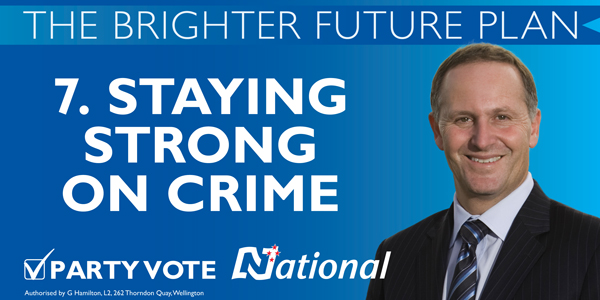
.
National’s ministers have never liked statistics. They have a tendency to show up the failings of this inept government. Who can forget then-Welfare Minister, Paula Bennett in August 2012 giving an explanation (of sorts) why her government was not willing to undertake measuring the poverty line;
.
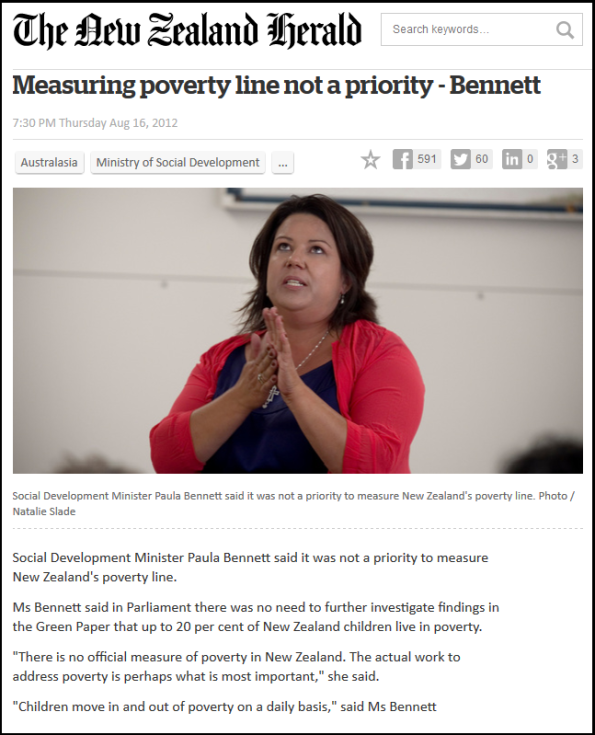
.
“ There is no official measure of poverty in New Zealand. The actual work to address poverty is perhaps what is most important. Children move in and out of poverty on a daily basis.”
Though how Bennett proposed to “address poverty” when she was fearful of even measuring it has never been fully explained.
But as we know, since Bennett’s decision, poverty has increased and stories of people living in garages, cars, and families crammed into over-crowded houses have come to light. Despite not being measured, poverty refuses to go away.
What an inconvenient, annoying nuisance.
On 29 June 2016, Statistics NZ announced that it would be changing the manner in which it defined a jobseeker;
Change: Looking at job advertisements on the internet is correctly classified as not actively seeking work. This change brings the classification in line with international standards and will make international comparability possible.
Improvement: Fewer people will be classified as actively seeking work, therefore the counts of people unemployed will be more accurate.
The statement went on to explain;
Change in key labour market estimates:
-
Decreases in the number of people unemployed and the unemployment rate
-
Changes to the seasonally adjusted unemployment rate range from 0.1 to 0.6 percentage points. In the most recent published quarter (March 2016), the unemployment rate is revised down from 5.7 percent to 5.2 percent
-
Increases in the number of people not in the labour force
-
Decreases in the size of the labour force and the labour force participation rate
The result of this change? At the stroke of a pen, unemployment fell from 5.7% to 5.2%.
Simply because if a person was job-searching using the internet they were “not actively seeking work“.
Which beggars belief as the majority of jobseekers will be using the internet. It is the 21st century – what else would they be using?
In fact, a government website – careersnz – states categorically;
.

.
Work and Income’s (WINZ) website states similarly;
.
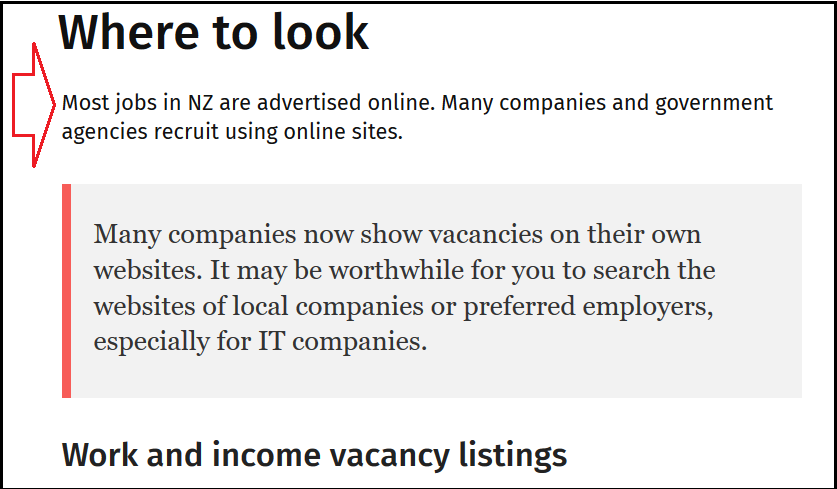
.
On-line job advertising company, Seek, reported a sharp rise in job adverts on their websites.
For the government statistician to unilaterally declare that “looking at job advertisements on the internet is correctly classified as not actively seeking work” beggars belief. One might as well say that if a person admitted to hospital shows no outward signs of serious illness, then that person is obviously not sick.
When most jobs are advertised online – as stated by government agencies!!! – where else would one look for a job? By studying tea-leaves perhaps?
The result of Statistics NZ’s “improvements” by removing online job-hunting as job-seeking is obvious; the rate of unemployment dropped.
How surprising.
Stats NZ actually seemed pleased with the consequence;
Fewer people will be classified as actively seeking work, therefore the counts of people unemployed will be more accurate.
How can “the counts of people unemployed” be “more accurate” if large numbers of unemployed are culled from the count?!?! In what Universe is this an accurate count to include some unemployed, but not others, for the most specious reason?
This makes no sense in terms of accurate statistics. To any sober person, an unemployed jobseeker is one who is;
- Unemployment
- Job-seeking
There is no rationale for arbitrarily removing job seekers who use the internet to seek work. Especially as two government departments encourage on-line searching because “most jobs in NZ are advertised online“.
There can only be one rational explanation: the unemployment statistics are inconvenient. Therefore change the parameters of the statistics.
This change to Statistics NZ is of considerable benefit to the National government. Their policies have consistently failed to reduced unemployment in a meaningful way.
The perception is that “strings have been pulled”; “whispers made into certain ears”; and Ministers’ expectations made clear to certain senior civil servants.
If all this is true, this would have to be one of the most under-hand things that National has done these last eight years. This would have to be one of the worst.
Aside from the fact that it is another in a long list of lies, bendy-truths, omissions, etc, this one is a wilful attempt to hide the consequences of their failing policies.
It was bad enough when Stats NZ defined being “employed” as;
Employed: people in the working-age population who, during the reference week, did one of the following:
* worked for one hour or more for pay or profit in the context of an employee/employer relationship or self-employment
* worked without pay for one hour or more in work which contributed directly to the operation of a farm, business, or professional practice owned or operated by a relative
If working one hour, without pay, is the minimum measure of being “employed”, then what must our true rate of unemployment actually be?
As much as possible, I deal with facts in my writing. But when supposedly independent, non-partisan, ostensibly-accurate data-collection and presentation is no longer a true reflection of reality, then we have reached a point where I am dealing in assumptions, half-facts, and outright distortions.
This government has done what few other Western democracies have achieved; a state of Orwellianism that Stalinist Russia, Nazi Germany, and other dictatorships required unrelenting brute force to achieve.
When it comes to National, believe nothing; question everything. Misinformation is policy.
Welcome – to National’s “Brighter Future”.
.
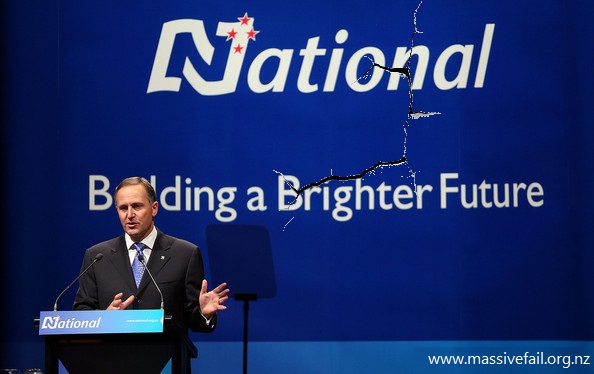
.
.
.
.
.
References
TVNZ: Q+A – Police Association president steps down
Radio NZ: English admits maths error in bill veto defence
Beehive.govt.nz: Offences at 24-year low, crime down for third year running
NZ Herald: Crime rate falls to 29-year low
NZ Herald: Police made burglaries vanish
NZ Herald: Two-year search for ‘ghost crimes’ truth
NZ Herald: Police deny being caught out by false review claims
NZ Herald: Warnings to petty crims ‘freeing up police time’
Radio NZ: Police concerned at national crime spike
Radio NZ: Checkpoint – Police concerned at national crime spike (audio)
NZ Herald: Measuring poverty line not a priority – Bennett
Statistics NZ: Household Labour Force Survey – Revisions to labour market estimates
Careersnz: Job hunting tips
Work and Income: Where to look
Fairfax media: Wellington jobs advertised on Seek up 11 per cent over past year
Statistics NZ: Household Labour Force Survey – Definitions
Other Blogposts
Polity: English canards
The Daily Blog: To make the unemployment stats drop, Government now claims anyone looking for jobs on the internet isn’t unemployed
The Standard: The great big list of John Key’s big fat lies (UPDATED)
The Standard: “Post-truth” politics (and false equivalences)
Previous related blogposts
John Key’s “pinch of salt” style of telling the truth
National – self-censoring embarrassing statements?
Weekend Revelations #3 – Greg O’Connor and criminal statistics
Media stories of the Week: Police Commissioner Mike Bush on dubious police practices
The Mendacities of Mr English – Fibbing from Finance Minister confirmed
The Mendacities of Mr Key # 16: The sale of Kiwibank eight years in the planning?
That was Then, This is Now #28 – John Key on transparency
.
.
.

.
.
= fs =
TDB Recommends NewzEngine.com


